Can Persian Cats Eat Salt? – A Comprehensive Guide
No, Persian cats should not eat salt. Salt is not a necessary part of a cat’s diet and can be harmful in large amounts. It is best to keep salt away from Persian cats.
Do you have a beloved Persian cat at home and wonder if it can safely eat salt? I’m sure you’ve heard both the warnings and the praises about salt for cats. As a loving pet parent, you want to make sure your furry friend gets the right amount of salt and all the right nutrients.
In this blog, I’m going to provide you with all the information you need to know about salt and Persian cats. We’ll discuss the benefits and risks of feeding salt to Persian cats, the recommended daily salt intake, salt-free diets, and the signs of too much salt in Persian cats. Finally, I’ll give you the best tips for feeding salt to your Persian cat.
What is the recommended daily salt intake for persian cats?
It’s a good idea to keep your Persian cat’s daily salt intake to a minimum, as too much salt can cause health problems. The recommended daily salt intake for Persian cats is between two and four milligrams per kilogram of body weight. To calculate your cat’s recommended salt intake, multiply your cat’s weight in kilograms by two or four, depending on their age and activity level.
In addition to monitoring your cat’s daily salt intake, you should also make sure they’re getting plenty of fresh water each day. Cats can become dehydrated quickly, so it’s important to make sure they have access to clean, fresh water at all times. It’s also important to keep their diet balanced and nutritiously complete. Make sure to feed your cat a high-quality diet that includes plenty of protein, healthy fats, vitamins, and minerals.
Remember that Persian cats can be very sensitive to salt, so it’s important to monitor their salt intake carefully. Too much salt can lead to excessive thirst, vomiting, and diarrhea. In addition, if your cat consumes too much salt, it can lead to an electrolyte imbalance in their body, which can be dangerous.
If you’re ever unsure about your Persian cat’s salt intake, talk to your veterinarian. They can help you determine the proper amount of salt for your cat and provide recommendations for a healthy diet.
What foods contain salt that are suitable for persian cats?
If you’re looking for salt-rich treats that your Persian cat can enjoy, you can start with some fish-based items. Tuna, mackerel, and salmon are all great sources of healthy salt. Additionally, they are high in protein and omega-3 fatty acids, both of which are essential for a healthy Persian cat diet.
For a special treat, you can also give your Persian cat some shrimp. Shrimp is high in salt as well as other essential nutrients like zinc, vitamin B12, and selenium. Just be sure to avoid any shrimp with added seasonings or sauces that are not meant for cats.
Cheese is another yummy and salt-rich food that Persian cats can enjoy. Just be sure to give them only small amounts of cheese, as it can be high in fat. You can also look for low-fat, low-salt varieties of cheese that are specifically made for cats.
Finally, you can give your Persian cat a few slices of cooked bacon. Bacon is high in salt, but it’s also high in fat, so it should be given in moderation. Make sure to remove all of the excess fat and grease before serving it to your cat.
These are just a few of the salt-rich foods that Persian cats can eat. Be sure to add a few of these items to your cat’s diet to ensure they get all the essential nutrients they need.
Are there any salt-free diets available for persian cats?
There are several brands of cat food that are specifically formulated to meet the nutritional needs of a Persian cat without any added salt. Not only is this important for a cat’s overall health, but it can also help reduce the risk of developing kidney or heart disease.
Salt intake can be a tricky thing to navigate with your furry friend. Persian cats are known to be more prone to heart and urinary issues, so a salt-free diet is a great way to ensure their health. It is important to look for a diet that contains low levels of sodium and is free from any added salt. Many pet food companies now offer salt-free diets specifically designed for Persian cats, so there are plenty of options available.
When it comes to finding the right salt-free diet for your Persian cat, it is important to do your research. Make sure to read the labels on the food and check for any added salt, as well as the sodium content. It is also a good idea to consult with your veterinarian, as they can recommend a food based on your cat’s individual needs.
Another great way to ensure that your Persian cat is getting the nutrition it needs without added salt is to feed it fresh, homemade cat food. There are plenty of recipes online that are specifically designed to meet the needs of a Persian cat without any added salt. Not only is this a healthier option than store-bought cat food, but it is also more cost-effective.
All in all, Persian cats can benefit from a salt-free diet. Whether you opt for a store-bought or homemade diet, make sure to do your research and consult with your veterinarian to ensure that your cat is getting the nutrition it needs.
What are the benefits and risks of feeding salt to persian cats?
Are you wondering if it’s safe to feed salt to your beloved Persian cat? Well, you’ve come to the right place! In this article, we’ll explore the benefits and risks of feeding salt to Persian cats, so you can make an informed decision about your cat’s diet.
Benefits of Feeding Salt to Persian Cats:
- Salt helps with electrolyte balance in cats, which can help improve their overall health.
- Salt helps cats maintain a healthy coat and skin by providing essential minerals and nutrients.
- Salt helps cats stay hydrated, which can help reduce the risk of heatstroke or other illnesses.
Risks of Feeding Salt to Persian Cats:
- Too much salt can be toxic for cats and can lead to serious health problems such as kidney failure.
- Feeding your cat too much salt can cause excessive thirst and dehydration.
- Salt can lead to an electrolyte imbalance in cats, which can be dangerous.
- Salt can lead to digestive issues in cats, such as vomiting and diarrhea.
So, as you can see, there are both benefits and risks associated with feeding salt to Persian cats. To ensure your cat stays healthy and happy, it’s best to consult your veterinarian before introducing salt into your cat’s diet.
What are the best tips for feeding salt to persian cats?
Here are the best tips for feeding salt to Persian cats:
- Make sure to give your cat a balanced diet. Salt should only be a small part of your cat’s diet. Avoid giving your cat too much salt in one meal.
- Use salt sparingly. You should only give your cat a pinch of salt per week. Too much salt can increase their blood pressure and cause dehydration.
- Choose the right kind of salt. Himalayan pink salt or sea salt are the best choices for Persian cats. Avoid table salt, as it can contain additives that could be harmful to cats.
- Monitor your cat’s health. Keep an eye out for any signs of dehydration or other health problems. If your cat is showing any strange symptoms, contact your vet immediately.
- Provide plenty of fresh water. Make sure to give your cat plenty of fresh water to drink. This will help to keep them hydrated and reduce the risk of dehydration due to salt consumption.
What are the signs of too much salt in persian cats?
Are you noticing signs of salt overconsumption in your Persian cat? Salt can be toxic to cats and is something they should not be consuming in large quantities. So, it’s important to know the signs of too much salt in Persian cats.
One major sign of salt overconsumption is vomiting. Excessive salt in the diet can cause your Persian cat to vomit and it will usually be accompanied by other digestive issues, such as diarrhea and abdominal pain. If your cat is vomiting regularly, it’s important to take them to the vet as soon as possible.
Another sign of too much salt in Persian cats is excessive thirst and urination. Your cat may be drinking more water and going to the litter box more often than usual. This is a sign that the salt is causing dehydration in your cat. It’s important to monitor your cat’s water intake and urination habits to ensure they’re not drinking too much.
If your Persian cat is consuming too much salt, they may also exhibit neurological issues. Too much salt can cause confusion, restlessness, and even seizures in cats. If you notice your cat displaying any of these symptoms, you should take them to the vet immediately.
Finally, too much salt can cause electrolyte imbalances in cats. If your cat has an electrolyte imbalance, they may display signs such as lethargy, weakness, and even cardiac arrhythmias. If you notice any of these signs, take your cat to the vet as soon as possible.
In conclusion, the signs of too much salt in Persian cats include vomiting, excessive thirst and urination, neurological issues, and electrolyte imbalances. If you think your cat has been consuming too much salt, take them to the vet immediately.

Frequently Asked Questions
What are the benefits of letting persian cats eat salt?
Letting Persian cats eat salt can provide numerous benefits for their health. Salt can help regulate hydration, improve skin and coat condition, reduce inflammation, and promote normal kidney and cardiovascular function. Additionally, salt can act as a natural appetite stimulant and help regulate electrolyte levels.
What other foods should persian cats avoid when eating salt?
Persian cats should avoid salty foods such as processed meats, salty snacks, and table salt. Additionally, salty foods with garlic and onions can be harmful to cats, so it is best to avoid these as well. Foods with high levels of sodium can cause dehydration and other health problems, so it is important to keep an eye on how much salt your Persian cat consumes.
How can you tell when persian cats have had too much salt?
If you think your Persian cat may have eaten too much salt, watch for signs of excessive thirst, vomiting, and diarrhea. Other signs include lethargy, lack of appetite, and general discomfort. If your cat is displaying these symptoms, contact your veterinarian immediately.
What natural alternatives can persian cats enjoy instead of eating salt?
Persian cats can enjoy a range of natural alternatives to salt in their diet. For example, they can nibble on fruits such as apples and bananas, or vegetables like carrots and celery. Furthermore, they can also consume small amounts of nuts and seeds, and low-sodium proteins like boiled chicken. Feeding them with these natural alternatives can provide essential vitamins, minerals and other nutrients they need while keeping their salt intake to a minimum.







